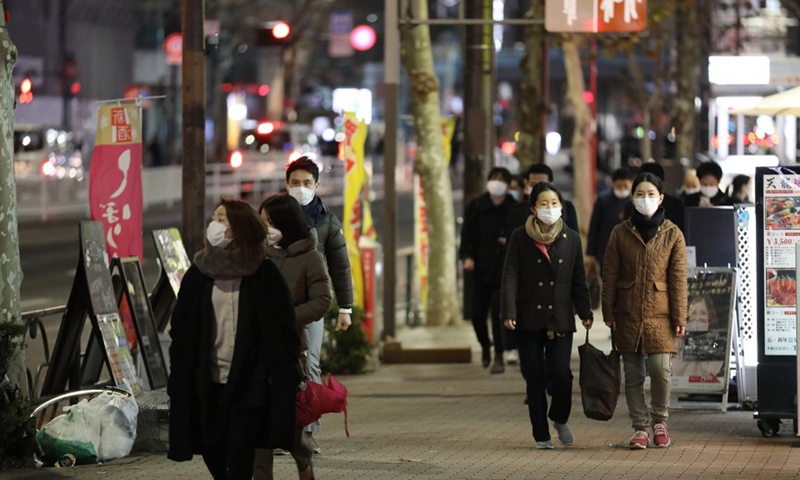
People wearing face masks walk on a street in Tokyo, Japan, Feb. 2, 2021. (Xinhua/Du Xiaoyi)
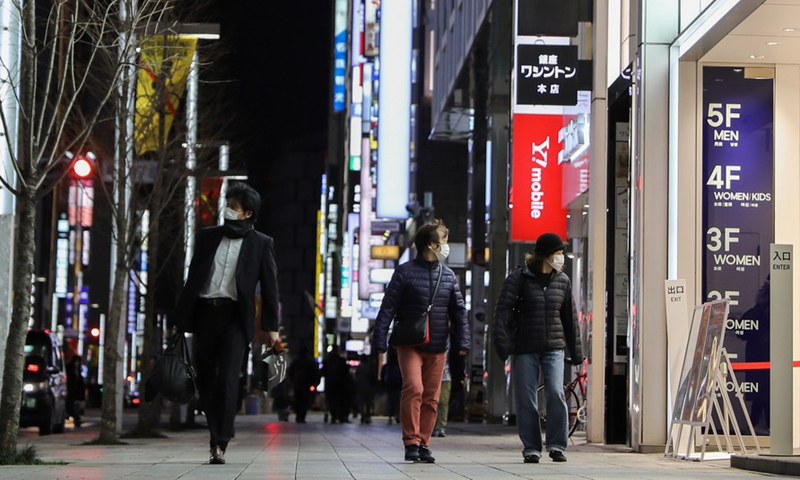
People wearing face masks walk on a street in Tokyo, Japan, Feb. 2, 2021. (Xinhua/Du Xiaoyi)
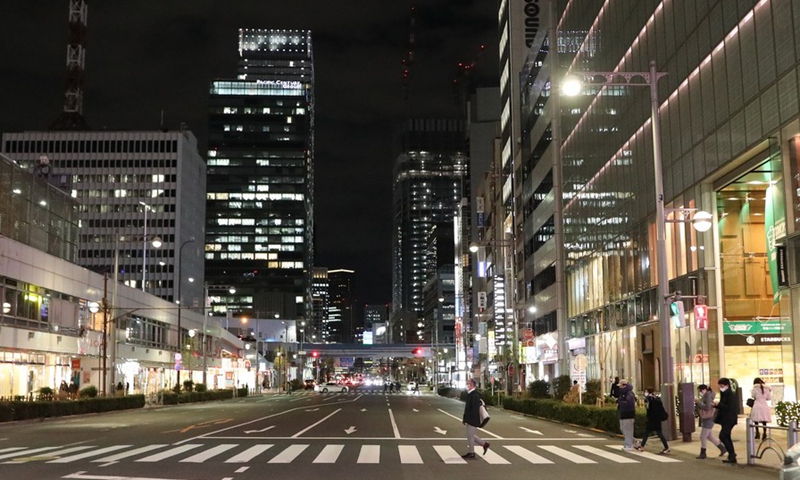
People wearing face masks walk on a street in Tokyo, Japan, Feb. 2, 2021. (Xinhua/Du Xiaoyi)
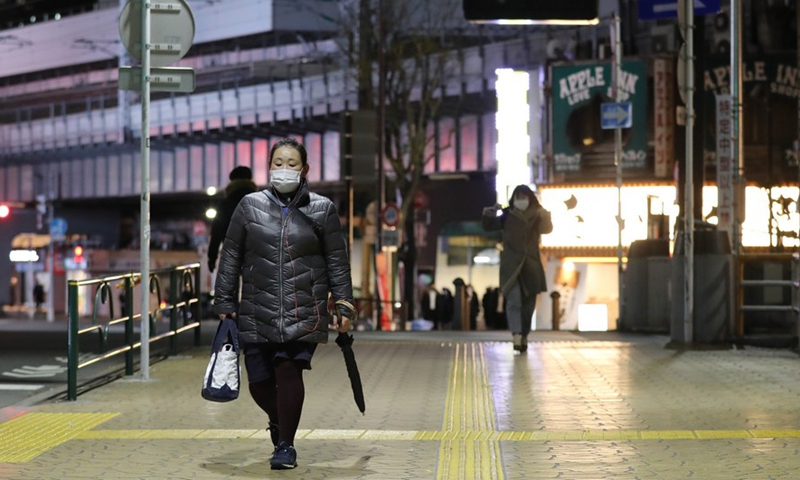
People wearing face masks walk on a street in Tokyo, Japan, Feb. 2, 2021. (Xinhua/Du Xiaoyi)
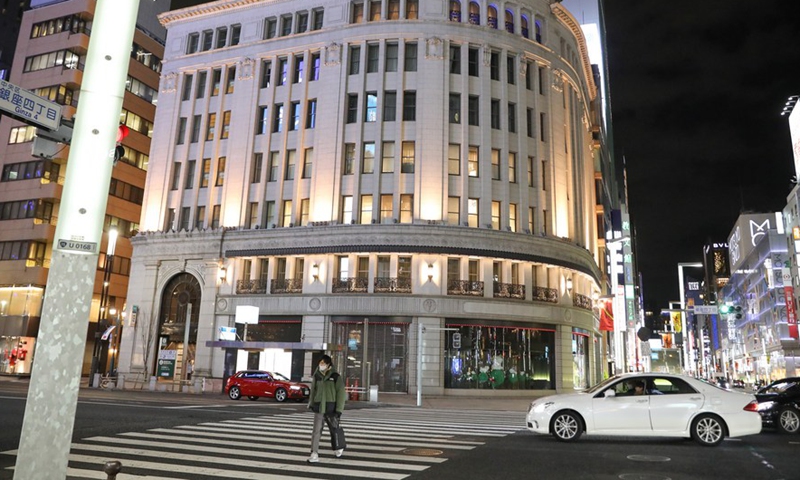
A pedestrian wearing a face mask walks on a street in Tokyo, Japan, Feb. 2, 2021. (Xinhua/Du Xiaoyi)
Japanese Prime Minister Yoshihide Suga said at a meeting of the government's COVID-19 task force Tuesday that the state of emergency in place for Tokyo and other regions hard hit by the novel coronavirus will be extended by one month until March 7.
The state of emergency initially declared by Suga on Jan. 7 will be extended for 10 of the 11 previously affected regions including Tokyo's neighboring prefectures of Saitama, Chiba and Kanagawa, as well as Osaka, Kyoto, Hyogo, Fukuoka, Aichi and Gifu prefectures.
Tochigi Prefecture will not be subjected to the extension and will have the state of emergency lifted on Feb. 7, as cases there have subsided markedly.
"Thanks to the measures and the cooperation of the Japanese people, we are beginning to see clear results. We are asking you to hang on for a little longer so that we can firmly establish a downtrend in infections," Suga told a press briefing on the matter after meeting with the COVID-19 task force.
Under the state of emergency declared last month, bars and restaurants were asked to shorten their operating hours and close their doors by 8:00 p.m. and people were asked to refrain from making unnecessary trips outdoors, especially in the evenings.
Along with businesses encouraging their employees to work from home, large venues had spectator numbers capped, all in a bid to combat the spread of the virus.
The measures have been successful to a degree, as when the emergency period was announced on Jan. 7, COVID-19 cases in Tokyo peaked at 2,447, compared to 393 coronavirus cases reported in the capital on Monday, the lowest in more than a month.
With 2,324 new infections reported nationwide as of 8:20 p.m. local time on Tuesday, bringing the nation's cumulative total of cases to 394,799 and death toll to 5,965 people.
The Tokyo metropolitan government, meanwhile, reported 556 new infections on Tuesday, with the number of new daily cases marking the fifth straight day that infections have dipped below the 1,000-mark.
New infections have risen, however, from the 393 new cases confirmed in the capital the previous day, which took cumulative infections over the 100,000-mark, leading some virus experts to question the efficacy of the state of emergency saying the daily infection figures are likely to fluctuate for the time being before rising again.
Suga's state of emergency has also drawn flak from opposition parties who have been critical of the fact that the measures instituted failed to bring the spread of the virus under control within the initial one month emergency period declared.
"We need a clear explanation from the prime minister why it couldn't be lifted in one month, and what measures the government plans to take over the next month," Tetsuro Fukuyama, secretary general of the main opposition Constitutional Democratic Party of Japan, told reporters Tuesday evening.
With the clock ticking down, Suga is now battling to contain the virus' spread ahead of the once-postponed Tokyo Olympics and Paralympics Games.
In response to a reporter's question whether the Games could go ahead without spectators, Suga responded noncommittally that ensuring a "safe and secure" event was the top priority.
But the obstacles that lie ahead for Suga and his administration are manifold and include the current strain on the medical system and the unavailability of beds for COVID-19 patients, with more people who have contracted the virus being turned away from hospitals and forced to self-quarantine at home.
In addition, the number of COVID-19-related deaths of individuals outside of hospitals and medical facilities has also been on the rise of late, also evidence of the dire strain healthcare facilities are facing.
The government here has also been accused of being slow in rolling out coronavirus vaccines compared to other countries such as the United States and Britain, especially as Japan was one of the first countries to ink contracts with major pharmaceutical firms last year whose vaccines showed promise in late stage clinical trials.
Inoculations, however, will not begin until mid-February at the earliest, the government has said.
At the end of January, the government said that British-Swedish pharmaceutical firm AstraZeneca Plc. will produce more than 90 million COVID-19 vaccine doses in western Japan, which is around 75 percent of the agreed number of jabs being produced locally.
JCR Pharmaceuticals Co., located in the western prefecture of Hyogo, will produce AstraZeneca's vaccine doses, with the Japanese pharmaceutical firm being charged with producing 120 million AstraZeneca shots, which is enough to inoculate 60 million people.
By March, Japan plans to import the remaining 30 million doses from AstraZeneca.
The Japanese government has made provisions for the country to receive a total of 310 million doses from AstraZeneca, and US pharmaceutical giants Pfizer Inc. and Moderna Inc.
The total number of doses will be enough to inoculate 157 million people, more than Japan's current population of about 126 million.
In addition, new laws on imposing fines on people and businesses thwarting requests to follow the country's measures to combat the pandemic are likely to be enacted in Japan's upper house of parliament on Wednesday.
The laws will make it possible to slap fines of 500,000 yen (4,700 US dollars) on COVID-19 carriers who refuse hospitalization, and penalties of up to 300,000 yen on those who do not comply with health officials' surveys.
Businesses that refuse to shorten their opening hours and close earlier under the state of emergency could be fined 300,000 yen.
Businesses in areas not under a state of emergency but where anti-virus requests have been made by local prefectures, meanwhile, could be slapped with a 200,000 yen fine for non-compliance.
The revisions made to Japan's coronavirus special measures law and the infectious diseases law to introduce the penalties passed the lower house on Monday.
